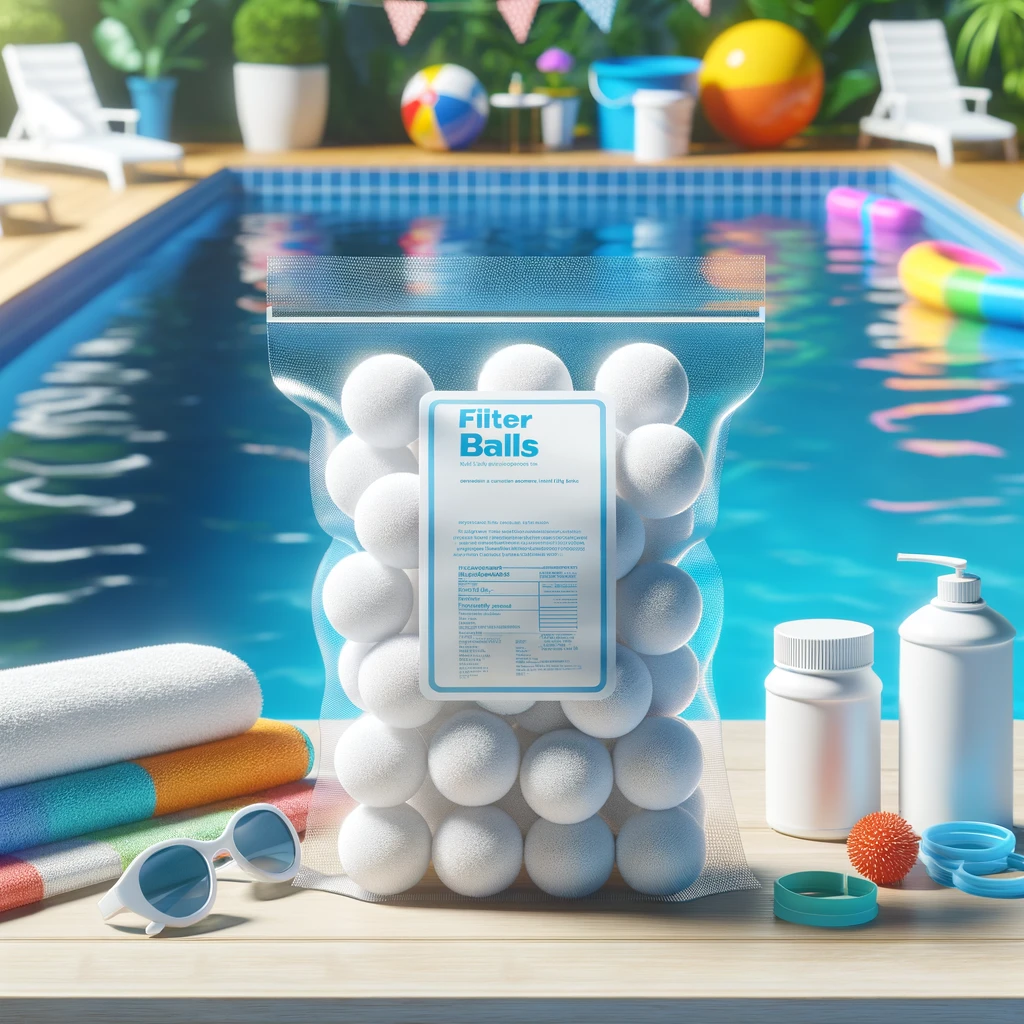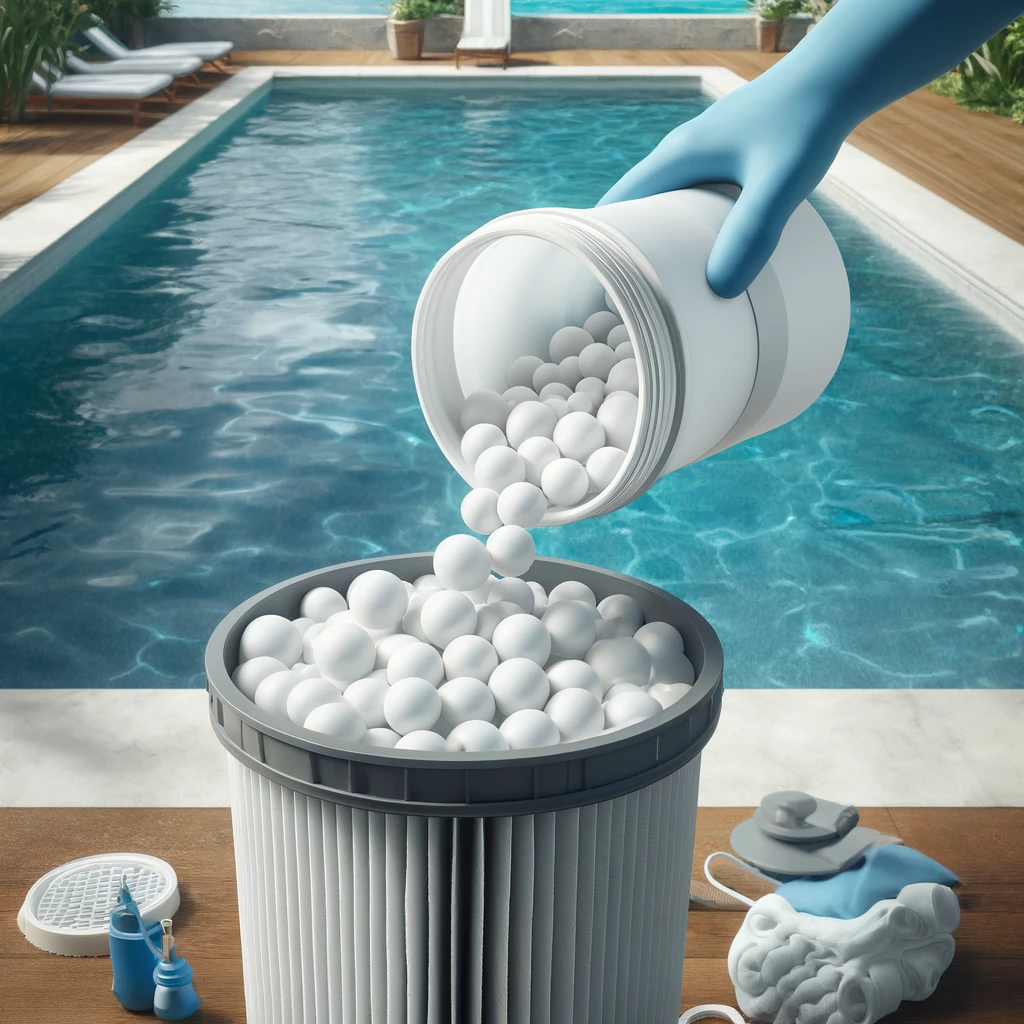Summer is here, and are you finding it challenging to maintain your pool’s water quality? You might have heard about pool filter balls, a new and increasingly popular pool filtration medium. But do you know how to effectively combine these filter balls with chemical treatments to achieve the best pool water management? This article dives deep into this topic to help you solve practical issues.
Difference Between Filter Balls and Traditional Sand Media
First, let’s understand the difference between pool filter balls and traditional sand media ( sand media for pool filter). Traditional sand media filters water through physical blocking and adsorption, but they have larger pore sizes, making them less effective at filtering fine particles. Additionally, sand can clump together and requires regular backwashing. In contrast, pool filter balls are made from special fiber materials with smaller pore sizes, capturing finer particles more effectively. They are also smaller, lighter, and easier to use and maintain.
The Role of Chemicals in Pool Water Treatment
To maintain pool water quality, we often need to use chemicals such as chlorine, pH adjusters, and flocculants. Each of these chemicals has a different role:
- Chlorine: Primarily used for disinfection, preventing the growth of bacteria and algae.
- pH Adjusters: Used to adjust the acidity and alkalinity of the water, keeping the pH between 7.2 and 7.6 to avoid irritation to the skin and eyes.
- Flocculants: Help gather small particles in the water, making them larger and easier for the filtration system to capture.
The Synergy Between Filter Balls and Chemicals
Combining pool filter balls with chemical treatments can significantly enhance water quality management. Here are some specific methods of synergy:

Enhancing Chlorine Efficiency
Pool filter balls have higher filtration precision, effectively capturing organic matter and microorganisms in the water, reducing their consumption of chlorine. Chlorine reacts with organic matter to form chloramines, which cause unpleasant odors and irritating substances in the pool water. By using pool filter balls, you can lower the organic content, reduce chloramine formation, and enhance chlorine’s disinfection efficiency.
Optimizing pH Adjustment
The water’s pH level directly affects chlorine’s effectiveness and swimmers’ comfort. Pool filter balls do not release fine sand or soil particles during filtration, which could destabilize the water’s pH. Using filter balls can maintain a more stable pH level, making pH adjusters more efficient and precise.
Boosting Flocculant Effectiveness
Flocculants work by gathering fine particles in the water into larger clumps, making them easier for the filtration system to capture. Due to their high precision filtering ability, pool filter balls can better capture the particles aggregated by flocculants, thus enhancing the flocculation effect. With filter balls, flocculants can work more effectively even at lower dosages, reducing the amount of chemicals used and maintenance costs.
Important Tips for Using Filter Balls
In practice, how do you correctly use pool filter balls and chemical treatments to maximize their synergy? Here are some key points:
Regular Inspection and Cleaning of Filter Balls
While pool filter balls have a longer lifespan, regular inspection and cleaning are essential. Periodically remove the filter balls from the filter, clean off surface dirt and deposits, and maintain their optimal filtering performance.
Proper Use of Chemicals
Although filter balls can enhance the effectiveness of chemicals, they should still be used according to recommended dosages. Overuse of chemicals is not only wasteful but can also negatively impact pool equipment and swimmer health.
Monitoring Water Quality Changes
Regularly monitor water quality parameters such as chlorine concentration, pH, and turbidity when using filter balls and chemicals. Adjust the chemical dosage and filter system operation promptly to ensure the water quality remains at its best.
Applications of Filter Balls in Different Pools
Different types of pools have varying requirements for filtration systems. Whether it’s a home pool, commercial pool, or public pool, pool filter balls can offer their unique advantages.
Home Pools
For home pools, easy maintenance and high efficiency are primary considerations. Pool filter balls are easy to install and have a long maintenance cycle, making them very suitable for home users. Additionally, the high efficiency of filter balls reduces the amount of chemicals used, lowering the daily maintenance cost of home pools.
Commercial Pools
Due to the high frequency of use, commercial pools require strict water quality standards. The high precision filtering ability of pool filter balls ensures clear water quality, enhancing swimmers’ experiences. Additionally, filter balls reduce the frequency of backwashing, conserving water resources.
Public Pools
Public pools have more complex water quality maintenance needs due to large numbers of swimmers. Using pool filter balls in public pools can effectively improve water quality management efficiency, reduce the growth of bacteria and algae, and ensure the pool water meets hygiene standards.
Conclusion: Introducing TBPFilter Efficient Pool Filter Balls
Looking for a reliable solution to maintain your pool water crystal clear? Look no further than TBPFilter’s efficient pool filter balls. Our filter balls offer numerous advantages:
- High Filtration Precision: Effectively captures fine particles, ensuring crystal clear water.
- Easy Maintenance: Lightweight and easy to clean, making pool maintenance a breeze.
- Eco-Friendly: Reduces the need for frequent backwashing, saving water and chemicals.
- Cost-Effective: Long lifespan and improved chemical efficiency lower your maintenance costs.
Switch to TBPFilter’s pool filter balls today and experience hassle-free pool maintenance! Enjoy your summer with clear, clean, and safe pool water.

